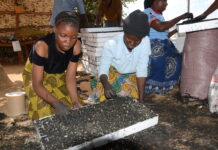“No need to be the strongest or smartest, but you must have determination and perseverance to change.”
Dr. Nimrod Israely – Founder and CEO – Biofeed Ltd
Too often, when I meet people connected to the African agro-industry, it sometimes seems like they have already given up on this industry and came to terms with the concept of failure and the conclusion that a “Farmer” is equal to “Poor”.
I even heard a senior government official stating and explaining that “farmers are used to poverty, and therefore life is not difficult for them“…..
Such a state of mind is disastrous and unacceptable! Such leadership will never lead to a CHANGE toward success, and such a statement proves that one knows little of farmers’ lives. On top of all, based on my experience and my family’s history, it is simply an incorrect statement, which I’m proof of that.
For “leaders” and others who, by mistake, think that poverty is a state from where one can’t escape, I wish to share the story of my father.
MUST FARMERS BE POOR?
At the beginning of the 20th century, the State of Israel did not exist. The farmers who lived in Israel were poor, and many of them survived only thanks to the support of European Jewish philanthropists.
My grandmother rode a donkey for hours until she came to the hospital to give birth to my father, and on August 31, 1932, my father was born. My grandmother almost died during childbirth because she did not know she had another baby in her womb, who died long before the birth. Luckily she and my Father, Ilan, both survived the birth.
In those days, it took a lot of luck for a baby to survive malaria and other diseases that brought down many cavities, especially among children.
So far, there is nothing special in this story. Those days this was the “normal” in this part of the world, ruled by the British and French. Moreover, the situation described above seemed unchangeable for many people with little belief in their ability to bring a change.
What is surprising is what happened next, in the following years.
In 1948 the British left Israel, and the Israeli state was born. Almost immediately, the Kibbutz where he was born, Ayelet HaShahar, was attacked by the army of enemy forces. At that time, my father was only 16, and luckily, he survived (again).
Surprisingly, despite the 1948 war, only four years later, when my father celebrated his 20th birthday, the farmers on his Kibbutz were no longer poor. I will keep the many reasons for the CHANGE for another time, for the fact remains the same; within a short time, farmers were no longer poor.
My father celebrated his 30th birthday at Kibbutz Tzuva (where I was born), where out of nothing, he founded the plantation industry. Together with other Kibbutz members, my father planted and grew state-of-the-art modern and profitable orchards.
When my father celebrated his 40th birthday, agriculture in my Kibbutz and Israel prospered. By this time, most agricultural practitioners already belonged to the prosperous middle class.
WHAT IS THE LESSON?
Do you think CHANGE is not possible in the African agro-sector and that all is lost and hopeless? Please think again.
My father was born into a low-income family and society, supported by European philanthropists, and had low survival chances.
Nevertheless, he survived and grew up to be a successful farmer, part of the Israeli middle class, who need not the support and help from philanthropists. Furthermore, my father’s children all have university degrees, and two hold a Ph.D. degree.
My father was born into poverty, high chance of death by malaria or war. He survived along with others who changed and turned Israel into a prosperous state with a worldwide recognized and leading agro-industry.
Why should one think that African farmers who live in poverty today can’t make a similar change and escape poverty while help building a strong economy and an educated young generation?
If I were a leader in a country where many citizens earn their living from agriculture BUT still live in poverty, I would not ask myself, “what are they doing wrong?” Instead, I would ask, “What should I do differently?“
“I” for everything starts with leadership; “Be the leader you wish to see”.
When thinking of the thriving Israeli agriculture, it is worth remembering that those who laid the foundations and are responsible for prosperity are mainly the same people born 70 to 100 years ago.
Those same people took extreme personal responsibility for their (and their families) future. They did not blame others when things went sour, and they did not wait for others (e.g., the state, donors) to do something for them. They worked hard, persevered, encountered countless problems, and overcome many obstacles on their way to CHANGE and create a better future.
My father worked until his last day. He worked not because he needed a livelihood but because he saw work as an essential and good part of a healthy lifestyle.
My father was part of the CHANGE and lucky enough to see the results of that historic change. Furthermore, he saw his children going to university and taking the CHANGE to new heights and places, even out of Israel.
It is clear that there is no reason why farmers of the emerging economies will not have the privilege to see and experience a similar CHANGE, and based on my experience, it is achievable.
CHANGE IS CONSTANT
No matter how big you are, you are never too big not to fall. Empires have fallen, and giant companies that dominated the global markets have disappeared.
They were replaced by some form of organization that introduced innovation, not necessarily a technological one.
Do you think any organization is immune to deterioration and disappearance?
Only CHANGE can save from deterioration and disappearance. However, human nature is to maintain the existing and CHANGE when there is no other choice.
The glorious agriculture of the State of Israel, which is so close to my heart, will disappear if it will not change and adapt to the 21st Century.
I write this column from far away South Australia, which is not poor. Yet, it is not immune from the need for continuous CHANGE, which is the only way to promise that the future will be prosperous more than the present.
My father’s story is about a change in thinking that led to changes in agriculture, which led to an improved economy impacting the future and fate of Israel.
Please, if you found value in this article, it would mean a lot to me if you send me a comment and share it with your friends.
Subscribe here for access to exclusive content – SUBSCRIBE.









[…] Source link […]
Comments are closed.